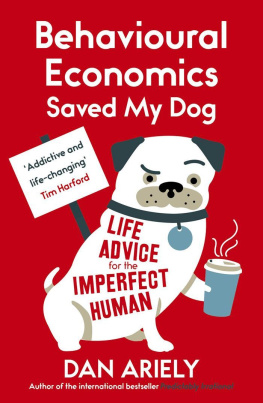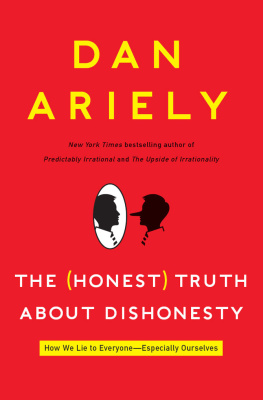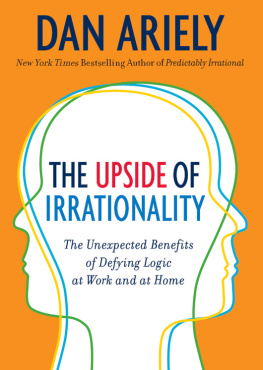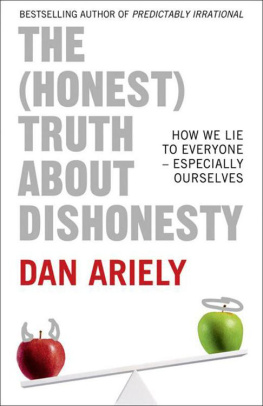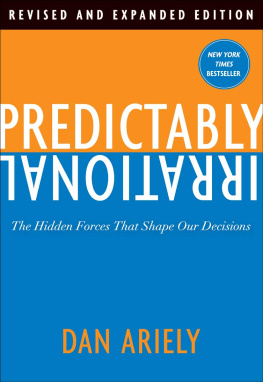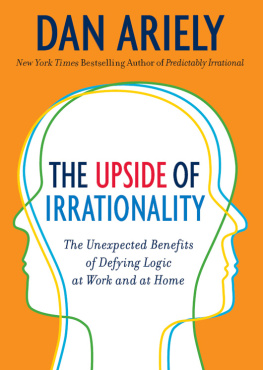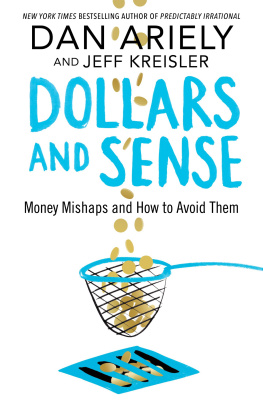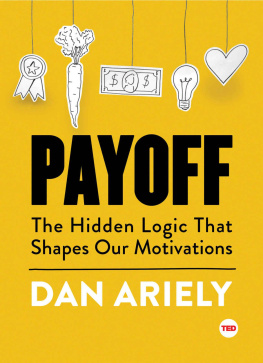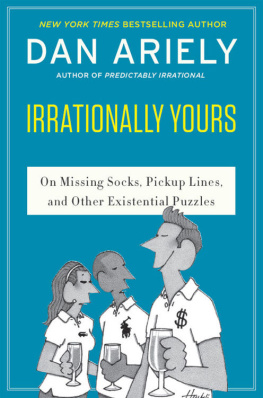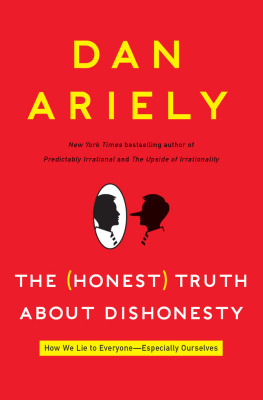Behavioural Economics Saved My Dog
ALSO BY DAN ARIELY
Predictably Irrational
The Upside of Irrationality
The Honest Truth About Dishonesty
Behavioural Economics Saved My Dog
Life Advice for the Imperfect Human
Dan Ariely
WITH CARTOONS BY
WILLIAM HAEFELI

(All profits from this book support research)

A Oneworld Book
First published in Great Britain and Australia by Oneworld Publications, 2015
This ebook edition published by Oneworld Publications, 2015
Copyright Dan Ariely 2015
The moral right of Dan Ariely to be identified as the Author of this work has been
asserted by him in accordance with the Copyright, Designs, and Patents Act 1988
Content from The Wall Street Journal is reprinted with permission from
The Wall Street Journal, and is copyright Dow Jones & Company, Inc.
All Rights Reserved Worldwide.
All illustrations 2015 William Haefeli. Except On the Art and Joy of Saying No, On Netflix Dissatisfaction, On Flashy Cars, On Playing Parents, and On Trashy Norms, all were previously published in The New Yorker.
All rights reserved
Copyright under Berne Convention
A CIP record for this title is available from the British Library
ISBN 978-1-78074-817-7
eISBN 978-1-78074-818-4
Oneworld Publications
10 Bloomsbury Street
London WC1B 3SR
England
Stay up to date with the latest books,
special offers, and exclusive content from
Oneworld with our monthly newsletter
Sign up on our website
www.oneworld-publications.com
To the oddities, complexities, and beauty of human nature
Contents
Based on the Ask Ariely column in The Wall Street Journal
New Questions and Advice
Introduction
Here is a possible rationalization: my ability to observe and reflect on human nature is rooted in my injury and its continuing effectsthanks to being ripped out of my teenage life, sustaining third degree burns on about 70 percent of my body, being hospitalized for almost three years, experiencing substantial daily pain, experiencing over and over the dysfunction of the American medical system, and having extensive scars that make me feel out of place in most social circumstances. Combined, these elements (so the rationalization goes) have made me a better observer of life. It is also what brought me to study social science.
Dont get me wrong; I dont think that my injury was worth it. No one can rationalize this much pain and misery. But the complex experiences of my injury, time in hospital, and life with extensive scars and disabilities have been my microscope on life. Through this perspective I have been able to observe substantial human suffering. I have seen people who managed their suffering and triumphed, and I have seen those who caved in. I have been exposed to different medical procedures and odd human interactions. From the distance of my hospital bed, I was able to observe the people around me go about their normal life, to wonder about human habits, and to speculate about the reasons we act the way we do.
Because of my scars, the pain, some odd-looking medical braces, and the pressure bandages that covered me from head to toe, the feeling of living separately from the normal day-to-day life did not stop when I left hospital. As I made my first steps back into the reality that I once took for granted, my viewpoint expanded to include more mundane daily activities such as the way we shop, drive, volunteer, interact with colleagues, take risks, fight, and behave thoughtlessly. And, of course, I could not help but notice the intricate fibre that governs romantic life.
With this perspective, I turned to study psychology. Very soon my personal and professional life became deeply intertwined. I remembered placebo medications for pain, and I conducted experiments to better understand the effects of expectations on painful treatments. I remembered some of the bad news I got while in hospital, and I tried to work out how best to break bad news to patients. There were many other topics that crossed the personal/professional boundary, and over time I learned more and more about my own decisions and the behaviours of those around me. This was more than twenty-five years ago and since then I have dedicated most of my time to trying to better understand human nature, focusing mostly on where we make mistakes and what can be done to improve our decisions, actions, and outcomes.
After writing academic papers on these topics for many years, I started writing about my research and its implications in a more conversational and less academic way. Perhaps because I described how my research grew out of my own difficult experiences, many people started sharing with me their personal struggles. Sometimes they were curious to know what social science can say about a particular experience they had, but most often these were questions about their own challenges and decisions.
While responding to as many of these requests as I could, it became apparent to me that some of these questions were of general interest. And in 2012, with permission of the people asking the questions, I started answering some of the broader questions publicly through my Ask Ariely column in the international newspaper, The Wall Street Journal. The book you are now holding in your hands includes some edited and expanded answers from the column in addition to some questions and answers that have not been previously published. Most importantly, this book also includes some wonderful cartoons by the talented William Haefeli that, in my opinion, deepen, improve, and expand my answers.
Now you have it. Aside from my ability to rationalize, does any of this make my advice more valuable, accurate, or useful? Ill let you be the judge.
Irrationally yours,
DAN ARIELY
Behavioural Economics Saved My Dog
ON ESCALATION OF COMMITMENTS
Dear Dan,
Every year, when Christmas comes, I feel obliged to send Christmas cards to everyone I know, and every year, the number of cards I send gets larger and larger. It is now officially getting out of hand. Can I switch to sending cards only to my really close friends?
HOLLY
A few years ago I was ordained by the Church of Spiritual Humanism, so I feel that I am in the position to tell you that it is perfectly fine for you to send cards only to your good friends. As a social scientist, I dont think anyone left off the list will be offended and many of them might not even notice. Taking this step will also reduce their feeling of obligation to send you a card next yearso in the process you are also helping them with the same problem. And if you really want to eliminate the Christmas-card frenzy, there is always Judaism.
Friends, Expectations, Happiness
ON THE ART AND JOY OF SAYING NO

And once theyd finished everything on their to-do lists, they lived happily ever after.
Dear Dan,
Ive recently been promoted, and I now receive all sorts of requests for things that have little to do with my love for my job. I recognize the importance of helping out colleagues and the organization as a whole, but these other activities are taking up too much of my time and making it impossible for me to do my job. How can I set my priorities better?

